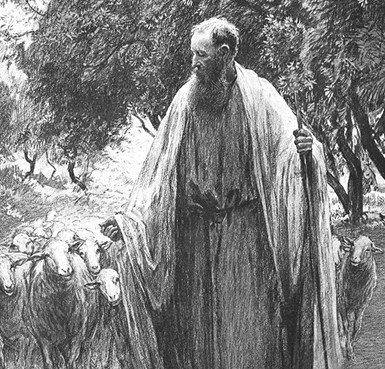The Gospels over the next weeks are drawn from the Gospel of John leading up to Jesus' farewell discourse to his disciples. Although we are just about halfway through the Easter season, these readings take us back to the Upper Room where Jesus shares a meal with his disciples and speaks his final words to them. Very often in John, Jesus describes himself using the words "I am" - "I am the true vine, I am the Way, the Truth, and the Life." And when we reflect on the metaphors that he uses to identify himself, we learn more and more about who Jesus is in our lives. We also learn much about ourselves and who we are to be.
 The Gospel today gives us another image which Jesus used to describe himself. He says I am "the gate for the sheep." He is the shepherd who calls his sheep by name and whose voice the sheep recognize and follow. There are a number of different reflections one can draw from this short narrative.
The Gospel today gives us another image which Jesus used to describe himself. He says I am "the gate for the sheep." He is the shepherd who calls his sheep by name and whose voice the sheep recognize and follow. There are a number of different reflections one can draw from this short narrative.
It important for us to remember that this passage was not just a memory that looked back on Jesus' life with his disciples. When Jesus talks about being the "gate" and the "gatekeeper," his intent is to focus both on the role of shepherd as well as on the attitude of the sheep. His view was much broader than simply the powerlessness and helplessness of the flock. Rather He was modeling a life-style to which He was inviting all of his followers to share: one of concern and compassion, of service and dedication, one of relentless and abounding love.
Today’s narrative would have challenged community leaders, "shepherds," who had failed their own communities and who had placed themselves above their people or preached a message they did not adhere to themselves. During our own time, when some church leaders and local shepherds have dismally failed their flock, it is comforting to hear Jesus' reminder that he would be a faithful shepherd and not abandon us like "thieves and robbers," or those looking only for their own profit or power.
But this parable is a challenge to us all. We are to be a reconciling, healing and unifying community. One of the effects of this pandemic is the extraordinary sacrifices and gestures of hospitality shown to those in need by their neighbors. Strangers have become friends because they have reached out beyond the usual confines of their private lives. Isn’t that what Jesus encourages us to do -- as he did -- lay down our lives for others? If we are to be Jesus’ followers then we cannot be bystanders when others are in need. Salvation is not simply a private thing.
We are a community and care of those in need is not just the job of a few professionals. Nor is the care of others just a matter of simply contributing to a “worthy cause”. "Laying down our lives for others" means that we are to be willing to give whatever is necessary of our lives to serve others. We are not to be like the thief who comes only "to steal and slaughter and destroy."
The eruption of God in our lives requires a profound change. We should be encouraged by Jesus' words today. He proclaims God's reign in order to awaken hope and call all people to change their way of thinking and acting. We are called to enter the gate and follow. But we are called to be shepherds of the flock as well. As both sheep and shepherds, we need to rediscover and reinterpret the Jesus message in a clear and decisive language that will speak to the world about how we see ourselves as His followers.
“I am the gate for the sheep.” Others will know HIm by the way they come to know us. And we will have life, and have it more abundantly.
Image: "The Good Shepherd" - Eugène Burnand





